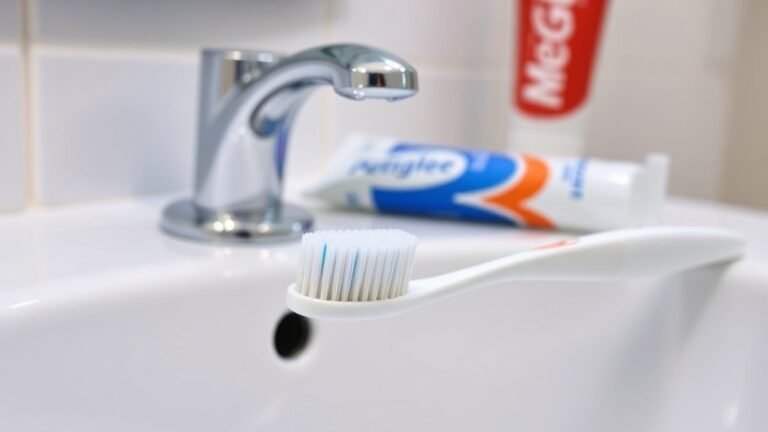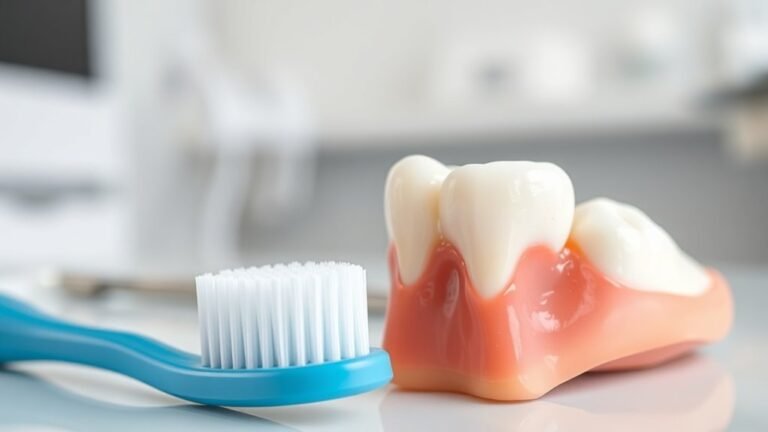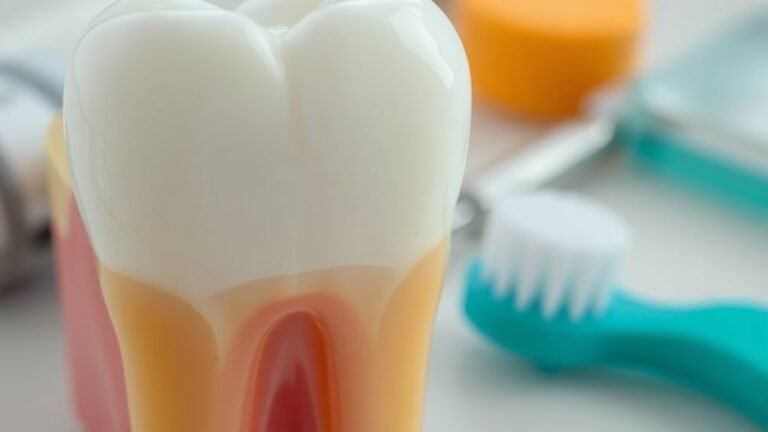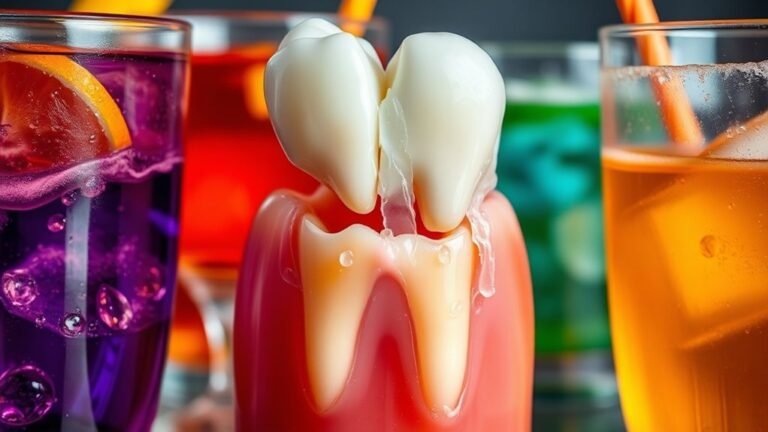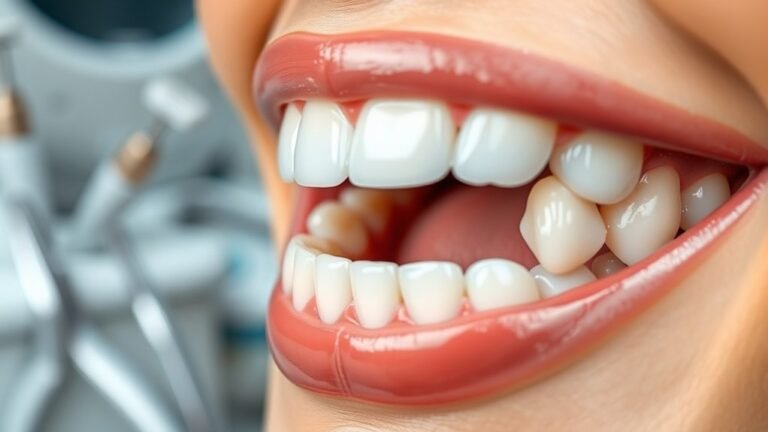What Lifestyle Habits Accelerate Enamel Erosion and Increase Tooth Sensitivity
Poor dietary choices, frequent sugary snacks, and excessive acidic beverages can speed up enamel erosion and heighten tooth sensitivity. Inadequate oral hygiene, overzealous brushing, and habits like teeth grinding worsen the issue. Additionally, smoking and neglecting regular dental check-ups can compromise your enamel’s health. By adopting better lifestyle practices, you can protect your teeth. There’s much to explore about maintaining your enamel and reducing sensitivity, allowing you to enjoy a healthier smile.
Key Takeaways
- Frequent consumption of acidic foods and beverages erodes enamel, leading to increased tooth sensitivity.
- Regular snacking on sugary foods promotes plaque build-up and accelerates enamel erosion.
- Inadequate oral hygiene practices, such as not brushing or flossing regularly, contribute to enamel wear and increased sensitivity.
- Smoking and tobacco use directly erode enamel and reduce saliva production, worsening tooth sensitivity.
- Neglecting dental check-ups can result in unnoticed enamel erosion, leading to more severe dental issues over time.
Poor Dietary Choices
When you indulge in poor dietary choices, you may inadvertently set the stage for tooth sensitivity. Consuming acidic foods, such as citrus fruits and sodas, can erode your enamel, making your teeth more susceptible to discomfort. This erosion compromises your oral hygiene, as the protective layer of enamel weakens, allowing stimuli to reach the nerve endings in your teeth. It’s essential to reflect on the nutrition in what you eat; a diet lacking in vital vitamins and minerals can further exacerbate enamel loss. To maintain ideal dental health, balance your meals with non-acidic, nutrient-rich foods. Prioritizing proper oral hygiene alongside a well-rounded diet will help you protect your teeth from sensitivity and other dental issues.
Frequent Snacking on Sugary Foods
While indulging in sugary snacks may provide a temporary burst of energy, it can greatly contribute to tooth sensitivity over time. Frequent snacking on sugary foods keeps sugar on your teeth for extended periods, leading to an increased risk of enamel erosion. When sugar interacts with bacteria in your mouth, it produces acids that attack your enamel, weakening its protective layer. This erosion not only heightens your cavity risk but also makes your teeth more susceptible to sensitivity. As your enamel wears away, you may experience discomfort when consuming hot, cold, or sweet foods. To protect your teeth, consider limiting sugary snacks and opting for healthier alternatives that can help maintain your enamel and overall dental health.
Excessive Consumption of Acidic Beverages
Excessive consumption of acidic beverages, such as soda, fruit juices, and energy drinks, can markedly exacerbate tooth sensitivity. These drinks contribute to acid erosion, weakening your enamel and leaving your teeth vulnerable. To protect your teeth, consider these tips:
Excessive acidic beverage consumption can worsen tooth sensitivity and erode enamel, making teeth more vulnerable.
- Limit your intake of acidic beverages.
- Use a straw to minimize contact with your teeth.
- Rinse your mouth with water after consuming acidic drinks.
- Choose beverages with lower acidity levels when possible.
Inadequate Oral Hygiene Practices
Acidic beverages can wreak havoc on your teeth, but inadequate oral hygiene practices can further aggravate tooth sensitivity. Your brushing habits play an important role in maintaining dental care. If you’re not brushing twice a day or using the right technique, dental plaque can accumulate, leading to enamel erosion and increased sensitivity. Neglecting to floss also contributes to plaque buildup between your teeth, where your toothbrush can’t reach. This buildup not only affects your enamel but can also lead to gum disease, exacerbating sensitivity issues. Regular dental check-ups are essential to professionally remove plaque and assess your oral health. By prioritizing effective brushing and thorough dental care, you can minimize the risks associated with inadequate oral hygiene and protect your teeth.
Overzealous Brushing Techniques
If you’re brushing too aggressively, you could inadvertently harm your teeth and gums, leading to increased tooth sensitivity. Overzealous brushing techniques can accelerate enamel wear, exposing the sensitive layers beneath. To maintain healthy teeth, consider these tips:
Brushing too hard can damage teeth and gums, increasing sensitivity. Opt for gentler techniques to protect your enamel.
- Use a soft-bristled toothbrush to minimize damage.
- Brush gently using circular motions instead of back-and-forth scrubbing.
- Limit brushing time to two minutes, focusing on each quadrant of your mouth.
- Replace your toothbrush every three months or sooner if the bristles fray.
Teeth Grinding and Jaw Clenching
When you grind your teeth or clench your jaw, you might unknowingly contribute to tooth sensitivity and other dental issues. Teeth grinding, often linked to stress or anxiety, wears down enamel, making your teeth more vulnerable to sensitivity and tooth pain. Over time, this habit can lead to cracks and fractures, further complicating your dental health. If you suspect you’re grinding your teeth, it’s essential to discuss this with your dentist during your dental visits. They may recommend a mouthguard or other strategies to protect your teeth and alleviate discomfort. Addressing teeth grinding not only helps preserve your enamel but also minimizes the risk of more severe dental problems in the future. Take control of your oral health today.
Smoking and Tobacco Use
Smoking and tobacco use can greatly harm your oral health, particularly affecting your tooth sensitivity. The chemicals in tobacco can erode enamel, while increased oral acidity and reduced saliva production further contribute to discomfort. Understanding these effects is essential for managing tooth sensitivity effectively.
Chemical Effects on Enamel
Many people underestimate the impact of smoking and tobacco use on dental health, particularly regarding tooth enamel. The chemical effects on enamel can lead to significant mineral loss, increasing tooth sensitivity. Here are some ways smoking affects your enamel:
- Reduced Saliva Production: Smoking decreases saliva flow, which is essential for enamel remineralization with fluoride.
- Acidic Compounds: Tobacco products contain acids that can erode enamel directly.
- Staining: Nicotine and tar can stain teeth, making damage more apparent.
- Increased Risk of Gum Disease: Smoking contributes to periodontal issues, further compromising enamel protection.
Increased Oral Acidity
The effects of smoking and tobacco use extend beyond enamel damage; they also greatly increase oral acidity. Increased oral acidity can lead to acid reflux, which further contributes to enamel erosion. The higher acidity levels in your mouth can interfere with the natural balance and health of your teeth, exacerbating sensitivity.
| Effects of Smoking | Impact on Oral Health |
|---|---|
| Increased Oral Acidity | Erosion of enamel |
| Acid Reflux | Further enamel damage |
| Decreased Saliva Flow | Less neutralization of acids |
| Higher Cavities Risk | Increased sensitivity |
| Gum Disease Potential | Compromised oral health |
Reduced Saliva Production
While you might not realize it, reduced saliva production from smoking and tobacco use can considerably impact your oral health. A dry mouth not only makes it uncomfortable to eat and speak, but it also disrupts the balance of your oral microbiome. Here are some consequences of reduced saliva production:
- Increased Tooth Sensitivity: Lack of saliva leads to enamel erosion, making your teeth more sensitive.
- Higher Cavity Risk: Saliva helps neutralize acids; less saliva means more cavities.
- Gum Disease: A dry mouth fosters bacteria growth, increasing gum disease risk.
- Bad Breath: Reduced saliva contributes to unpleasant odors due to bacterial proliferation.
Addressing dry mouth can improve your overall oral health and reduce sensitivity.
Neglecting Regular Dental Check-Ups
Neglecting regular dental check-ups can lead to significant oral health issues, including increased tooth sensitivity. When you skip these appointments, you miss out on essential dental cleanings that help remove plaque and tartar buildup, which can wear down enamel. Poor gum health often follows, as untreated gum disease can exacerbate sensitivity. Regular visits allow your dentist to monitor your enamel and address any early signs of erosion before they become severe. Additionally, they can provide personalized advice on maintaining your oral health, including dietary recommendations. By prioritizing check-ups, you’re not just protecting your teeth; you’re investing in your overall well-being. Don’t let neglecting regular dental check-ups compromise your smile and comfort.
Frequently Asked Questions
How Can I Reverse Enamel Erosion at Home?
You can reverse enamel erosion at home by using fluoride toothpaste, maintaining proper oral hygiene, limiting acidic foods and drinks, and staying hydrated. Regular dental check-ups will help monitor your progress and provide additional guidance.
Is Tooth Sensitivity Permanent After Enamel Erosion?
Tooth sensitivity after enamel erosion isn’t necessarily permanent. With proper care, like using desensitizing toothpaste and avoiding acidic foods, you can reduce discomfort and potentially regain some enamel strength, improving your overall dental health.
What Are the Signs of Early Enamel Erosion?
Like a whisper of decay, early enamel erosion reveals itself through tooth sensitivity, discoloration, and rough surfaces. You might notice increased discomfort with hot or cold foods, hinting at the need for dental attention.
Can Certain Medications Contribute to Enamel Erosion?
Yes, certain medications can contribute to enamel erosion. Acidic medications, dry mouth-inducing drugs, and those affecting saliva production may increase your risk. It’s vital to discuss any concerns with your dentist for tailored advice.
Are There Specific Supplements That Help Protect Enamel?
Yes, certain supplements can help protect enamel. Calcium, vitamin D, and phosphorus support enamel strength. Additionally, fluoride supplements can remineralize your teeth, reducing sensitivity. Always consult your dentist before starting any new supplement regimen.
Conclusion
In conclusion, protecting your enamel is essential for maintaining your dental health. Remember, “an ounce of prevention is worth a pound of cure.” By making better dietary choices, practicing good oral hygiene, and avoiding harmful habits like smoking and teeth grinding, you can greatly reduce the risk of enamel erosion and tooth sensitivity. Regular dental check-ups also play an important role in keeping your smile healthy. Take these steps now to safeguard your teeth for the future.

